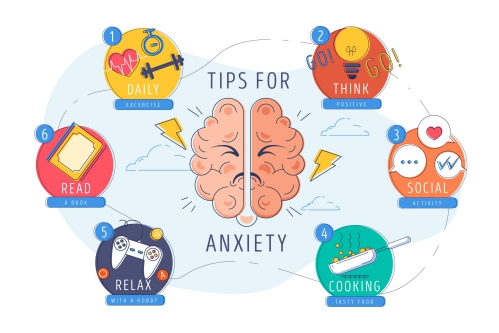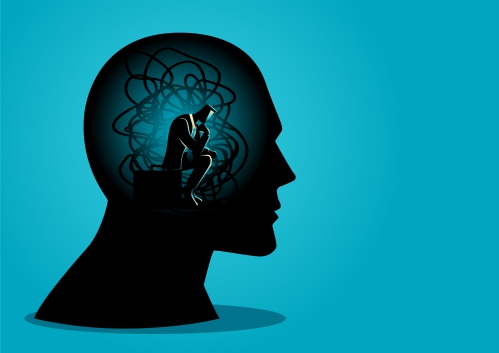What are anxiety disorders?
Anxiety is a normal emotion that everyone feels now and then. It is your body’s natural response to stress which can be in various forms. For example, going to your exams, job interview or giving a speech in front of your friends.
However, if your level of anxiety rise to a point where you cannot perform your normal activities (for example, going out of the house, entering the elevator or going to places where there are many people) or last longer than 6 months, then you may be suffering from an anxiety disorder. Fortunately, with the appropriate treatment most people can overcome those emotions and regain their normal lives. According to the American Psychiatric Association, women are more likely to be diagnosed with an anxiety disorder than men.
What are the types of anxiety disorders?
Anxiety has a central role in various different disorder such as:
- Social anxiety disorder: also known as social phobia, is when you feel very anxious or extreme fear about going out in social situation as you apprehend the judgement of others about you.
- Panic disorder: this is when you experience repeated panic attacks that strikes at random. You may be always on your guard awaiting the next episode. During a panic attack you may have chest pain, feel palpitations, sweat or even feel like you are having a heart attack.
- Specific phobias: in this condition you feel extremely anxious about a specific object or situation (for example, insects, being at heights or on plane). This fear will prevent you from doing activities that any other person finds normal.
- Generalized anxiety disorder: this is when you feel excessive, unreasonable worry and stress with little or no reason.
- Obsessive-compulsive disorder: in this condition you have a tendency towards excessive orderliness, perfectionism and exceptional attention to detail and tend to perform specific and repeated behaviours (almost like a ritual).
- Separation anxiety disorder: this is a disorder characterized by recurrent and excessive fear of being away from home or loved ones.
- Illness anxiety disorder: also known as hypochondriasis or health anxiety, is when you excessively worry that you are or may become ill even though there are no physical symptoms.
- Post-traumatic stress disorder (PTSD): this usually occurs in people who have experienced or witnessed a traumatic situation such as a car accident, death of a loved one, war or rape. The person often relieves the same experience through nightmares and flashbacks affecting his daily activities.

What are the causes of anxiety?
The exact cause of anxiety is currently unknown. However, scientists think that it is a combination of environmental stress, changes in the brain and even your genes. Stress from a job, school, financial, health and interpersonal relationship problems can significantly contribute to anxiety disorders.

Who are at risk for anxiety?
There are several factors which can lead to anxiety. Some of them are:
- Genetics: if you have a family history of anxiety disorders, you have a higher chance of suffering from anxiety one day.
- Trauma: High stress events like a car accident or sexual abuse can lead to an anxiety disorder (for example, post-traumatic stress disorder).
- Absent parent: losing a parent or being away from your parents for a long period of time at a young age can predispose you to have an anxiety disorder. In addition, other family problems such as alcoholism, violence and sexual abuse can also strongly contribute.
- Depression: if you have depression you are also most likely to be suffering from an anxiety disorder.
- Constant stress: ongoing worry about financial issues or work can lead to anxiety. Furthermore, a nerve-racking environment like a warzone is also a predisposing factor.
- Self-harm: This behaviour is linked with mental problems such as PTSD and anxiety.
- Personality: Certain personality traits can facilitate the development of an anxiety disorder such as moral inflexibility, obsession with details, oversensitivity to criticism and timidity in social situation.
- Loneliness: this is a feeling that everyone must have felt at some point in their lives. However, letting it linger will eventually lead to an anxiety disorder.
- Substance abuse: anxiety disorders are strongly linked to substance abuse. For example, the use of drugs may cause shame upon the person leading to anxiety.
- Physical illness: conditions like heart disease, diabetes, hypertension and asthma are often associated with anxiety.

Signs and symptoms of anxiety
The sign and symptoms of anxiety build up slowly over time and these include:
- Having a sense of panic or imminent danger
- Feeling nervous, tense or agitated
- Having an increased heart rate
- Trembling
- Sweating
- Rapid breathing
- Inability to sleep
- Overwhelming worry causing an inability to concentrate in other activities
- Inability to overcome your worry
- Avoiding activities or situations that may trigger your anxiety
Making a diagnosis
Diagnosis anxiety is a long process consisting of mental health evaluations, psychological questionnaires and physical examination.
A complete physical examination is conducted in order to rule out any other conditions which may be causing your anxiety symptoms. In addition, your doctor will take a look at the medications that you are currently taking to make sure that the anxiety is not a side effect of those drugs.
The psychological questionnaire is used to scale the severity of your anxiety in order to direct the treatment accordingly.

Treatment of anxiety

After you have been diagnosed with anxiety, the possible treatment options will be discussed by your doctor. There are mainly 3 categories of treatment; lifestyle modifications, psychotherapy and medication.
Lifestyle modification
- Practice physical exercises regularly
- Eat a healthy diet with plenty of water, fresh fruits and vegetables, avoiding sugary drinks
- Avoid alcohol consumption as it is itself a depressant therefore, worsening your symptoms
- Get adequate sleep which will have a strong effect on your mood
- Meditation and adopting a positive thinking attitude can affect your perception of the world and make you feel calmer and happier
- Identify your causes of stress and find out healthy ways of coping with it
- Social support is very important to reduce isolation and loneliness which are building blocks for anxiety and depression
- Having a strong sense of purpose can provide you with a psychological buffer against obstacles- meaning that even when you are having a bad day you will still be satisfied with life and move forward
- Reduce caffeine consumption
- Smoking cessation
Psychotherapy
Psychotherapy also known as talk therapy is a term used for treating mental health issues by talking to a psychiatrist or psychologist.

There are several types of psychotherapy techniques, however the one used for anxiety is cognitive behavioural therapy (CBT). CBT is a short-term, goal-oriented treatment that has a practical approach to problem solving. It is used to change your patterns of thinking or behaviour that are the main sources of your difficulties and hence change the way you feel.
Medications
There are mainly 4 types of medications that are used to treat anxiety:
- Selective serotonin reuptake inhibitor (SSRI) is a type of antidepressant which works by stopping the absorption of serotonin (a chemical which is important in mood regulation) in the brain. Some examples of SSRI are citalopram, escitalopram and fluoxetine.
- Serotonin-norepinephrine reuptake inhibitor (SNRI) is another class of antidepressants that reduce the absorption of both serotonin and norepinephrine. Examples of SNRI are duloxetine and venlafaxine.
- Tricycle antidepressants (TCA) are antidepressant drugs are used when SSRIs are not effective. Some examples of TCA are amitriptyline, imipramine and nortriptyline.
- Benzodiazepine is a type of sedative drug that encourage muscle relaxation hence reducing the physical symptoms of anxiety such as tense muscle. Some examples of benzodiazepine are diazepam, lorazepam and alprazolam.
Complications
Suffering from an anxiety disorder can lead to several other medical and mental health issues, such as:
- Depression
- Substance abuse
- Digestive problems
- Difficulty to sleep
- Social isolation
- Headaches
- Inability to concentrate at work or school
- Poor quality of life
- Suicide

Prevention
Anyone can one day be affected by an anxiety disorder hence you may take some steps to either prevent its occurrence or at least reduce the impact of symptoms on your daily life if you are anxious and these are:
- Stay active by participating in activities that you take pleasure in
- Get help as soon as possible as the more you delay the more difficult it is to treat
- Avoid drugs or alcohol use as it can worsen your anxiety symptoms
Source:
Baldwin, D., n.d. Generalized anxiety disorder in adults: Epidemiology, pathogenesis, clinical manifestations, course, assessment and diagnosis
Bystritsky, A., n.d. Pharmacotherapy for generalized anxiety disorder in adults



